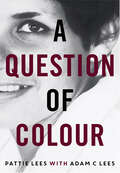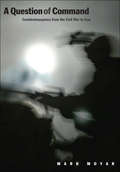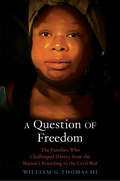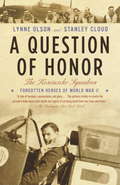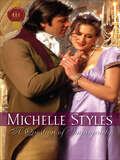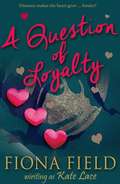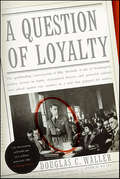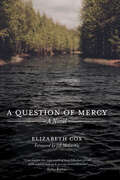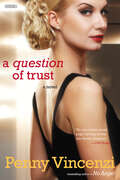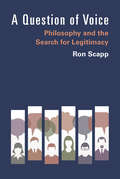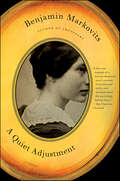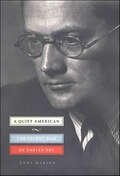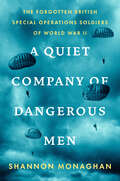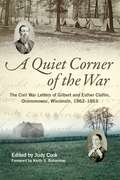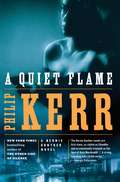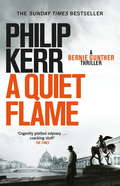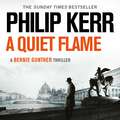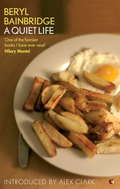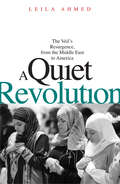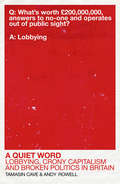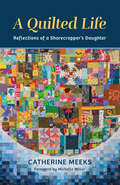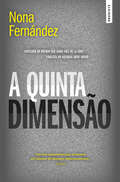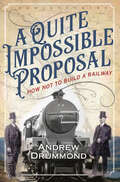- Table View
- List View
A Question of Colour
by Pattie Lees Adam LeesAutobiography of a victim of the stolen generation in Australia.
A Question of Command: Counterinsurgency from the Civil War to Iraq
by Mark MoyarAccording to the prevailing view of counterinsurgency, the key to defeating insurgents is selecting methods that will win the people's hearts and minds. The hearts-and-minds theory permeates not only most counterinsurgency books of the twenty-first century but the U. S. Army/Marine Corps Counterinsurgency Field Manual,the U.S. military's foremost text on counterinsurgency. Mark Moyar assails this conventional wisdom, asserting that the key to counterinsurgency is selecting commanders who have superior leadership abilities. Whereas the hearts-and-minds school recommends allocating much labor and treasure to economic, social, and political reforms, Moyar advocates concentrating resources on security, civil administration, and leadership development. Moyar presents a wide-ranging history of counterinsurgency, from the Civil War and Reconstruction to Afghanistan and Iraq, that draws on the historical record and interviews with hundreds of counterinsurgency veterans, including top leaders in today's armed forces. Through a series of case studies, Moyar identifies the ten critical attributes of counterinsurgency leadership and reveals why these attributes have been much more prevalent in some organizations than others. He explains how the U.S. military and America's allies in Afghanistan and Iraq should revamp their personnel systems in order to elevate more individuals with those attributes. A Question of Command will reshape the study and practice of counterinsurgency warfare. With counterinsurgency now one of the most pressing issues facing the United States, this book is a must-read for policymakers, military officers, and citizens.
A Question of Freedom: The Families Who Challenged Slavery from the Nation’s Founding to the Civil War
by William G. Thomas IIIThe story of the longest and most complex legal challenge to slavery in American history <P><P> For over seventy years and five generations, the enslaved families of Prince George’s County, Maryland, filed hundreds of suits for their freedom against a powerful circle of slaveholders, taking their cause all the way to the Supreme Court. Between 1787 and 1861, these lawsuits challenged the legitimacy of slavery in American law and put slavery on trial in the nation’s capital. <P><P>Piecing together evidence once dismissed in court and buried in the archives, William Thomas tells an intricate and intensely human story of the enslaved families (the Butlers, Queens, Mahoneys, and others), their lawyers (among them a young Francis Scott Key), and the slaveholders who fought to defend slavery, beginning with the Jesuit priests who held some of the largest plantations in the nation and founded a college at Georgetown. A Question of Freedom asks us to reckon with the moral problem of slavery and its legacies in the present day.
A Question of Honor
by Lynne Olson Stanley CloudA Question of Honor is the gripping, little-known story of the refugee Polish pilots who joined the RAF and played an essential role in saving Britain from the Nazis, only to be betrayed by the Allies after the war.After Poland fell to the Nazis, thousands of Polish pilots, soldiers, and sailors escaped to England. Devoted to liberating their homeland, some would form the RAF's 303 squadron, known as the Kosciuszko Squadron, after the elite unit in which many had flown back home. Their thrilling exploits and fearless flying made them celebrities in Britain, where they were "adopted" by socialites and seduced by countless women, even as they yearned for news from home. During the Battle of Britain, they downed more German aircraft than any other squadron, but in a stunning twist at the war's end, the Allies rewarded their valor by abandoning Poland to Joseph Stalin. This moving, fascinating book uncovers a crucial forgotten chapter in World War II-and Polish-history.From the Trade Paperback edition.the Battle of Britain, where their daredevil skill in engaging German Messerschmitts in close and deadly combat while protecting the planes in their own groups soon made them legendary. And we learn what happened to them after the war, when their country was abandoned and handed over to the Soviet Union.A Question of Honor also gives us a revelatory history of Poland during World War II and of the many thousands in the Polish armed forces who fought with the Allies. It tells of the country's unending struggle against both Hitler and Stalin, its long battle for independence, and the tragic collapse of that dream in the "peace" that followed. Powerful, moving, deeply involving, A Question of Honor is an important addition to the literature of World War II.From the Hardcover edition.
A Question of Impropriety
by Michelle StylesDiana Clare has had enough of London-the balls, the rakes you can never trust.... Now, having returned home in disgrace, she is trying to forget what drove her from the ton.Rake and gambler Brett Farnham, Earl of Coltonby, seems intent on making Diana remember exactly what it was like to be whirled around the ballroom and seduced by the glint in her partner's eye....But Brett has "mistress" rather than "marriage" in mind, and Diana is not sure her reputation can stand up to another scandal....
A Question of Loyalty
by Kate LaceYvie first meets Adam and Pammy Clifton as neighbours in quarters in Germany, where she has been posted with her soldier husband, Richard. Their friendship is cemented by the shared experience of army life, but is put to the test when the relationship between Adam and Yvie turns into a short-lived but passionate affair. Years later Yvie is certain that she has put all memory of that ill-fated liaison behind her. But when a released terrorist from Richard's past as a bomb-disposal expert puts his life in danger, she is forced, reluctantly, to turn to her old friends for help. Seeking refuge at the Clifton's home in the Lake District, together with her teenage daughter Claire, Yvie is all too aware of the smouldering attraction between herself and Adam, and is determined that it will not be reignited...
A Question of Loyalty: Gen. Billy Mitchell and the Court-martial That Gripped the Nation
by Douglas C. WallerA Question of Loyalty plunges into the seven-week Washington trial of Gen. William "Billy" Mitchell, the hero of the U.S. Army Air Service during World War I and the man who proved in 1921 that planes could sink a battleship. In 1925 Mitchell was frustrated by the slow pace of aviation development, and he sparked a political firestorm, accusing the army and navy high commands -- and by inference the president -- of treason and criminal negligence in the way they conducted national defense. He was put on trial for insubordination in a spectacular court-martial that became a national obsession during the Roaring Twenties.Uncovering a trove of new letters, diaries, and confidential documents, Douglas Waller captures the drama of the trial and builds a rich and revealing biography of Mitchell.
A Question of Mercy: A Novel (Story River Bks.)
by Elizabeth CoxThe mysterious death of a mentally disabled boy sends his stepsister on the run in this historical novel by the Robert Penn Warren Award–winning author.Rural North Carolina, 1950s. When young Adam Finney is found dead in a river, his teenaged stepsister, Jess Booker, is sought for questioning by the police. Making a desperate escape, Jess treks and hitchhikes across four states to a boarding house in tiny Lula, Alabama. Pursued by a mysterious car with a faded “I Like Ike” sticker, she is also haunted by memories of her mother’s early death, her father’s distressing marriage to Adam’s mother, the loving bond she formed with Adam, and her boyfriend Sam’s troubling letters from the thick of combat in the Korean War. In Lula, Jess finds a respite among a curious surrogate family, as well as the strength to return home and face the questions she cannot answer about her stepbrother’s death.Set in the mid-twentieth-century South, A Question of Mercy examines individual freedom and responsibility, as well as America’s legacy of shameful practices regarding the mentally disabled. Through her vibrant characters and lush southern settings, Elizabeth Cox illuminates the moral, ethical, and seemingly unnatural decisions people face when caring for society’s weakest members.Foreword by Dos-Passos Prize–winning author Jill McCorkle
A Question of Trust: A Novel
by Penny Vincenzi“With a rich cast of characters buffeted by love, betrayal and loyalty, glamour and conflict, this is Vincenzi at her best.” —Woman & HomeIn 1950s London, Tom Knelston is charismatic, charming, with a passion for politics and reform. He is a man with ambition—and someone to watch. His wife Alice, a former nurse, shares his ideals. It seems they are the perfect match. Then, out of the blue, Tom meets an old childhood acquaintance, the beautiful and unhappily married Diana Southcott, a fashion model. In many ways, she is everything Tom fights against, but she is also irresistible and so, flirting with danger, they embark on an affair that is potentially damaging to both. And when his child becomes ill, Tom is forced to make decisions about his principles, his career, his marriage, and, most of all, his love for his child.A Question of Trust is a vintage Penny Vincenzi novel: rich in characterization, life-changing decisions, love, desire, and conflict.Praise for Penny Vincenzi“The doyenne of the modern blockbuster.” —Glamour“Soap opera? You bet—but with her well-drawn characters and engaging style, Vincenzi keeps things humming.” —People“Nobody writes smart, page-turning commercial women’s fiction like Vincenzi.” —USA Today“Will draw you in against your better judgment and keep you awake reading all night.” —The Boston Globe“Vincenzi does it again with another captivating and entertaining family saga that combines power, riches, lies, and greed . . . For fans of Barbara Taylor Bradford and Danielle Steel.” —Library Journal
A Question of Voice: Philosophy and the Search for Legitimacy
by Ron ScappA Question of Voice: Philosophy and the Search for Legitimacy offers an explicit and comprehensive consideration of voice as a complex of rethinking aspects of the history of philosophy through issues of power, as well as contemporary issues that include and involve the desire for and the dynamics of legitimacy, for individuals and communities. By identifying voice as a significant theme and means by which and through which we might better engage some important philosophical questions, Ron Scapp hopes to expand traditional philosophical discussion and discourse regarding questions about validity, legitimacy, empathy, and solidarity. He offers an innovative perspective that is informed and guided by multiculturalism, ethnic studies, queer studies, feminism, and thinkers and critics such as bell hooks, Barbara Christian, Angela Davis, Jacques Derrida, Michel Foucault, among others. A Question of Voice is an American investigation, but also suggests questions that emanate from contemporary continental thought as well as issues that arise from transnational perspectives—an approach that is motived by doing philosophy in an age of multiculturalism.
A Quiet Adjustment: A Novel
by Benjamin Markovits"A first-rate example of a literary historical novel." —Regan Upshaw, San Francisco ChronicleIn his "Byron trilogy," Benjamin Markovits lovingly reinvents the nineteenth-century novel, true to its perfect prose, penetrating insight, and simmering passions. Inspired by the actual biography of Lord Byron—the greatest literary figure and most notorious sex symbol of his age—Markovits re-imagines Byron’s marriage to the capable, intellectual, and tormented Annabella and the scandal that broke open their lives and riveted the world around them: Byron’s incestuous relationship with his impetuous half-sister, Gus. Their very different understandings of love and one’s obligations to society lead them all—and the reader—headlong to a devastating conclusion.
A Quiet American: The Secret War of Varian Fry
by Andy MarinoAndy Marino's A Quiet American is an effort to examine the life of a genuine American hero whose political and cultural influence remain largely unacknowledged. The story of Varian Fry, called the "real Rick" of Casablanca, is perhaps one of the most unknown, yet extraordinary sagas of World War II. This penetrating biography follows Varian Fry through his adult life--from his beginnings in the 1930s as a Harvard graduate and political journalist to his arrival in Marseille in 1940 where he managed to spirit away thousands of Europe's cultural elite by falsifying passports, creating new identities, and always resorting to subterfuge. The list of those saved includes: Hannah Arendt, Andre Breton, Franz Werful and his wife Alma Mahler, Heinrich Mann, Marc Chagall, Jacques Lipchitz, Andre Masson, and Max Ernst among others.
A Quiet Company of Dangerous Men: The Forgotten British Special Operations Soldiers of World War II
by Shannon MonaghanThe untold story of four special operations officers who fought together behind enemy lines across multiple theaters of World War II, and then continued to serve, officially and unofficially, for decades after in the hottest parts of the Cold WarThere have always been special warriors; Achilles and his Myrmidons are the obvious classical examples. What we now think of as &“special operations,&” however, were born in World War II, and one of the earliest and most exciting units formed was Britain's SOE. In the early years of the war, when Britain stood alone against the Nazis, Winston Churchill put them on a mission to &“set Europe ablaze&”: to foment local revolt, to gather intelligence, to blow up bridges, and to do anything that could help to disrupt the Axis cause. A Quiet Company of Dangerous Men follows four SOE officers who distinguished themselves in this fight: the Spanish Civil War veteran Peter Kemp, the demolitions expert David Smiley, the born guerrilla leader Billy McLean, and the political natural Julian Amery.With new and extensive research, including unprecedented access to private family papers that reveal the men's unbreakable bonds and vibrant personalities, Shannon Monaghan has uncovered a story of war in the twentieth century that, due to the secretive nature of the SOE&’s work, has remained largely unknown. A Quiet Company of Dangerous Men is a thrilling and inspiring story of four remarkable men who, through sheer determination and daring, as well as unwavering friendship and loyalty, fought for a better world.
A Quiet Corner of the War
by Gilbert Claflin Esther ClaflinIn 2002, Judy Cook discovered a packet of letters written by her great-great-grandparents, Gilbert and Esther Claflin, during the American Civil War. An unexpected bounty, these letters from 1862-63 offer visceral witness to the war, recounting the trials of a family separated. Gilbert, an articulate and cheerful forty-year-old farmer, was drafted into the Union Army and served in the Thirty-Fourth Wisconsin Infantry garrisoned in western Kentucky along the Mississippi. Esther had married Gilbert when she was fifteen; now a woman with two teenage sons, she ran the family farm near Oconomowoc, Wisconsin, in Gilbert's absence. In his letters, Gilbert writes about food, hygiene, rampant desertions by drafted men, rebel guerrilla raids, and pastimes in the daily life of a soldier. His comments on interactions with Confederate prisoners and ex-slaves before and after the Emancipation Proclamation reveal his personal views on monumental events. Esther shares in her letters the challenges and joys of maintaining the farm, accounts of their boys Elton and Price, concerns about finances and health, and news of their local community and extended family. Esther's experiences provide insight into family, farm, and village life in the wartime North, an often overlooked aspect of Civil War history. Judy Cook has made the letters accessible to a wider audience by providing historical context with notes and appendixes. The volume includes a foreword by Civil War historian Keith S. Bohannon.
A Quiet Flame (Bernie Gunther #5)
by Philip KerrBernie Gunther returns to trail a serial killer in 1950's Buenos Aires When he introduced Bernie Gunther in the original Berlin Noir trilogy, Philip Kerr immediately established himself as a thriller writer on par with Raymond Chandler. His new Bernie Gunther novels have won him comparisons with Alan Furst, John le Carré, and Graham Greene. A Quiet Flame finds Gunther in Argentina, circa 1950, where he- falsely accused of Nazi war crimes-has been offered a new life and a clean passport by the Perón government. But the tough, fast-talking detective doesn't have the luxury of laying low when a serial killer- whose crimes may reach back to Berlin before the war-is mutilating young girls. Taut, gritty, and loaded with evocative historical detail, A Quiet Flame is among Kerr's best work yet.
A Quiet Flame: Bernie Gunther Thriller 5 (Bernie Gunther)
by Philip KerrArgentina, 1950: Bernie Gunther arrives in Buenos Aires only to be caught up in the hunt for a killer. A young girl has been murdered in circumstances that strongly resemble those of Bernie's final case as a Berlin homicide detective, a case he didn't solve.The local chief of police is convinced that the killer is to be found among the several thousand ex-Nazis who have come to Argentina since 1945. So who better than Bernie Gunther to help track him down?
A Quiet Flame: Bernie Gunther Thriller 5 (Bernie Gunther)
by Philip Kerr'One of the greatest anti-heroes ever written' LEE CHILDPosing as an escaping Nazi war-criminal Bernie Gunther arrives in Buenos Aires and, having revealed his real identity to the local chief of police, discovers that his reputation as a detective goes before him. A young girl has been murdered in peculiarly gruesome circumstances that strongly resemble Bernie's final case as a homicide detective with the Berlin police. A case he had failed to solve. Circumstances lead the chief of police in Buenos Aires to suppose that the murderer may be one of several thousand ex Nazis who have fetched up in Argentina since 1945. And, therefore, who better than Bernie Gunther to help him track that murderer down?(P) 2022 Quercus Editions Limited
A Quiet Life: A Novel (Virago Modern Classics #36)
by Beryl BainbridgeSeventeen-year-old Alan can't stand rows. But, though the Second World War has ended, peace hangs by a fine thread at home: his troublesome sister Madge creeps off for night-time liaisons with a German POW; their ineffectual father - broken by the hardships of war and an unhappy marriage - can't put food on the table despite the family's middle-class manners.Meanwhile, his mother pursues her escapist fantasies in romantic novels and love affairs. Obedient, faithful Alan is trapped among them all, the focus of their jibes and resentment, as inexorably the family heads towards disaster. Beryl Bainbridge's classic early novel is a vintage story of English domestic life, laced with sadness, irony and wicked black humour.'One of the best novelists of her generation' - Guardian.
A Quiet Life: A Novel (Vmc Ser. #488)
by Beryl BainbridgeSeventeen-year-old Alan can't stand rows. But, though the Second World War has ended, peace hangs by a fine thread at home: his troublesome sister Madge creeps off for night-time liaisons with a German POW; their ineffectual father - broken by the hardships of war and an unhappy marriage - can't put food on the table despite the family's middle-class manners.Meanwhile, his mother pursues her escapist fantasies in romantic novels and love affairs. Obedient, faithful Alan is trapped among them all, the focus of their jibes and resentment, as inexorably the family heads towards disaster. Beryl Bainbridge's classic early novel is a vintage story of English domestic life, laced with sadness, irony and wicked black humour.'One of the best novelists of her generation' - Guardian.
A Quiet Revolution: The Veil's Resurgence, from the Middle East to America
by Leila AhmedIn Cairo in the 1940s, Leila Ahmed was raised by a generation of women who never dressed in the veils and headscarves their mothers and grandmothers had worn. To them, these coverings seemed irrelevant to both modern life and Islamic piety. Today, however, the majority of Muslim women throughout the Islamic world again wear the veil. Why, Ahmed asks, did this change take root so swiftly, and what does this shift mean for women, Islam, and the West? When she began her study, Ahmed assumed that the veil's return indicated a backward step for Muslim women worldwide. What she discovered, however, in the stories of British colonial officials, young Muslim feminists, Arab nationalists, pious Islamic daughters, American Muslim immigrants, violent jihadists, and peaceful Islamic activists, confounded her expectations. Ahmed observed that Islamism, with its commitments to activism in the service of the poor and in pursuit of social justice, is the strain of Islam most easily and naturally merging with western democracies' own tradition of activism in the cause of justice and social change. It is often Islamists, even more than secular Muslims, who are at the forefront of such contemporary activist struggles as civil rights and women's rights. Ahmed's surprising conclusions represent a near reversal of her thinking on this topic. Richly insightful, intricately drawn, and passionately argued, this absorbing story of the veil's resurgence, from Egypt through Saudi Arabia and into the West, suggests a dramatically new portrait of contemporary Islam.
A Quiet Word: Lobbying, Crony Capitalism and Broken Politics in Britain
by Tamasin Cave Andy RowellQ. What’s worth £2,000,000,000, answers to no-one and operates out of public sight? A. Britain’s influence industry The corporate takeover of democracy is no conspiracy theory – it’s happening, and it affects every aspect of our lives: the food we eat, the places we live, the temperature of our planet, how we spend our money and how our money is spent for us. And much more. A Quiet Word shows just how effectively the voice of public interest is being drowned out by the word in the ear from the professional persuaders of the lobbying industry. And if you’ve never heard about them, that’s because the most effective lobbying goes unnoticed. A Quiet Word shines the brightest of lights into one of the darkest and least-understood corners of our political culture. It is essential, urgent, authoritative reading for anyone interested in our democracy and where this country is heading. And by showing how influence is constructed, it puts power back in your hands.
A Quilt for Christmas
by Sandra Dallas[from inside dust jacket flaps] ""It is 1864 and Eliza Spooner's husband, Will, has joined the Kansas Volunteers to fight the Confederates, leaving her with their two children and in charge of their home and land. Eliza is confident that he will return home, and she helps pass the months making a special quilt to keep Will warm during his winter in the army. When the unthinkable happens, she takes in a woman and child who have been left alone and made vulnerable by the war, and she finds solace and camaraderie among the women of her quilting group. And when she is asked to help hide an escaped slave, she must decide for herself what is right, and who she can count on to help her. With rich historical detail and vibrant characters, A Quilt for Christmas is the perfect novel about the bonds of family and the true meaning of sacrifice. Sandra Dallas is the author of thirteen novels, including Fallen Women, True Sisters, The Bride's House, Whiter Than Snow, Prayers for Sale, Tallgrass, and New Mercies. She is a former Denver bureau chief for BusinessWeek magazine and lives in Denver, Colorado. Visit her at www.sandradallas.com." The Persian Pickle Club by Sandra Dallas is also set in Kansas and about the friendships among quilters. It is the story of the grand daughters of the characters in A Quilt for Christmas and is in the Bookshare collection along with Tall Grass and The Quilt Walk with more to come.
A Quilted Life: Reflections of a Sharecropper's Daughter
by Catherine MeeksCatherine Meeks shares the wisdom she has garnered over the journey of her life, from her father&’s sharecropping fields to the academy and beyond. Today, Catherine Meeks is a national leader of racial healing and an esteemed retired professor of African American studies. But being a Black woman in America can be difficult. Join Meeks as she describes the adventures and adversity she encountered on her path to becoming an empowered voice for change. Growing up in Arkansas under the terror of Jim Crow, Meeks learned firsthand about injustice and the desperation it causes. But with the support of her family, she moved to LA to study at Pepperdine. When a Black teenager was killed by a campus security guard, Meeks awakened to her prophetic voice, and a local women&’s group gave her hope that racial reconciliation was possible. She later led a group of students to West Africa, where she met her husband. Yet her years-long battle with rheumatoid arthritis severed their relationship, leaving her a single mother. Meanwhile, she worked tirelessly at Mercer University to expand the African American studies program, all while earning her MSW and PhD. Quilting together these memories—bitter and sweet, traumatic and triumphant—Meeks shares her hard-earned wisdom: Learn how to discern the Creator&’s work. Listen to the voice saying &“yes&” to opportunity. Become a wounded healer. Know when to practice silence and when to speak out. Readers will leave the pages of A Quilted Life enriched by Meeks&’s unique perspective and insight.
A Quinta Dimensão
by Nona FernándezLivro Vencedor do prestigiado Prémio Sor Juana InÉs de la CruzE Finalista do National Book Award for fiction 2021 Um livro assombroso que reconstitui, através dos mecanismos da ficção, um dos períodos mais sombrios e brutais da história da América Latina por uma das escritoras mais importantes da atualidade. Corre o ano de 1984, no Chile. Em plena ditadura militar de Augusto Pinochet, um elemento dos serviços de segurança dirige-se a uma revista oposicionista para confessar a sua participação nos piores crimes do regime. Revela nomes de agentes e de desaparecidos, moradas de centros de detenção e os métodos de tortura aplicados. A jornalista grava o seu chocante testemunho, publica esta história de terror, e escancara as portas de uma realidade paralela, de uma Quinta Dimensão, cinzenta e brutal, somente intuída pela generalidade da sociedade, incluindo a narradora, que é apenas uma criança quando vê pela primeira vez o rosto banal desse homem e as palavras «Eu torturei» na capa da revista. Este facto real, transformado em memória — ou sonho? —, irá marcar indelevelmente a sua vida adulta e a sua carreira de escritora e documentarista, levando-a a embrenhar-se, com a chave da imaginação, nessa dimensão desconhecida, nesse mundo secreto onde as rotinas da manhã, um jogo de xadrez, Iuri Gagarin ou uma série de televisão coexistem com a vida paralela de um país. Seguindo o fio desta história verdadeira, Nona Fernández recorre aos mecanismos da ficção para chegar aos seus cantos mais sombrios, onde nem a memória pessoal ou coletiva nem os arquivos de documentos conseguem chegar, reconstruindo, com uma prosa luminosa e obsessiva, um dos períodos mais brutais da história da América Latina. Os elogios da crítica: «Um romance fascinante que convida os leitores a entrar nos negros portais da História onde as pessoas e as histórias apagadas pelos regimes autoritários são finalmente iluminadas.» — Chicago Review of books«A meio caminho entre jornalismo, literatura e memória pessoal, Nona Fernández consegue revelar o estado emocional de uma nação inteira perante o seu negro e porventura vergonhoso passado.» — Jurados do prémio Sor Juana Inés de la Cruz «Um livro assombroso que se tornará um clássico da literatura latino-americana.» — El País «A Quinta Dimensão é um contributo extremamente inovador e importante para a literatura mundial, e não só chilena, sobre o trauma e o seu rescaldo.» — The New York Times «[Fernández] ousa ir além dos arquivos históricos que apresentam os crimes da ditadura chilena como casos isolados, revelando um mundo alternativo que assombra o espírito da nação.» — New York Magazine«Fernández encontrou a resposta para uma pergunta urgente: fazer arte é sempre insuficiente, mas é, ainda assim, um ofício poderoso.» — Harper’s Magazine«Nona Fernández ajuda-nos a vislumbrar a realidade terrorífica da tortura — e a forma ainda mais terrorífica como ela se transforma em rotina — numa prosa luminosa de grande inteligência e obsessiva sinceridade.» — Fernanda Melchior
A Quite Impossible Proposal: How Not to Build a Railway
by Andrew DrummondBy the author of An Abridged History, “a detailed examination of an overlooked chapter in Scotland’s transport history” (The Scotsman).In the 1890s, the people of north-west Scotland grew tired of Government Commissions sent to consider a railway to Ullapool. Despite rock-solid arguments in favor of such a railway, neither government nor the big railway companies lifted a finger to build one. Against the recommendations of its own advisers, the Scottish Office dismissed the project as “a quite impossible proposal.” This book tells the whole sorry tale of the attempt to improve transportation in the north-west Highlands and the resulting government inquiries, set against the region’s economic and social problems and civil unrest in the crofting communities. Stories, facts and figures have been unearthed from the archives of government departments and railway companies, from local people’s letters and petitions, from contemporary newspapers and from the plans prepared for the hoped-for railways. Other unbuilt railways to the north-west coast are also described.But this story is not just about planned railways that were never built. It is about the frustrations of the people of the Highlands in the face of government incompetence, railway-company obstructionism, local rivalries and the struggle against the historical injustice of land ownership.“Delves deep into the archives to reveal an astonishing story of establishment incompetence and indifference—and some west coast skullduggery—contriving to thwart the energy and enthusiasm of locals keen to share in the benefits which railways had brought to other Highland communities.” —RailScot
